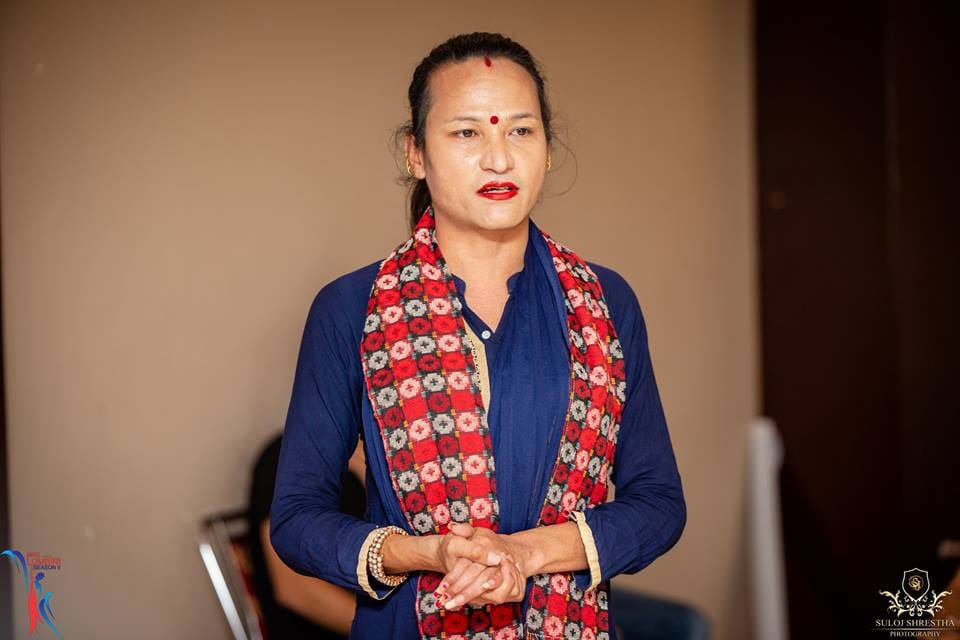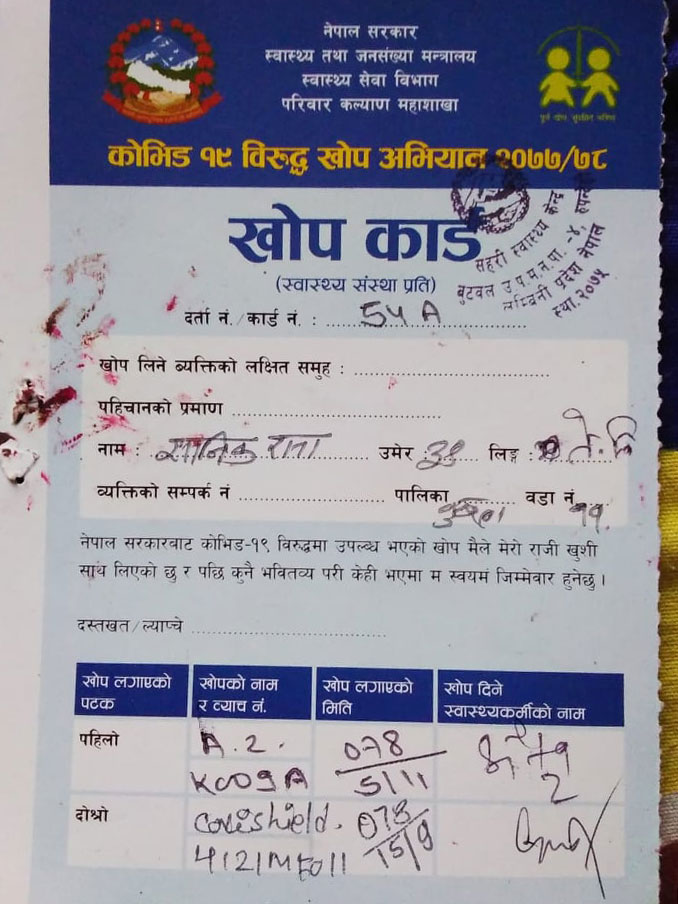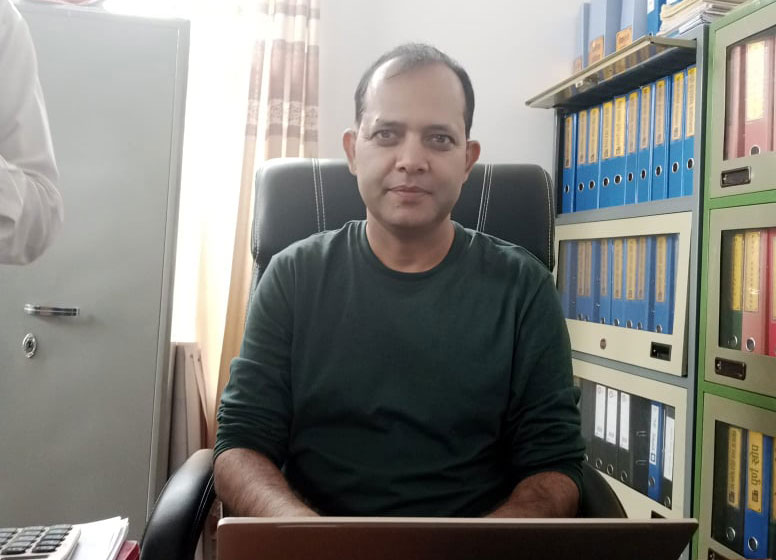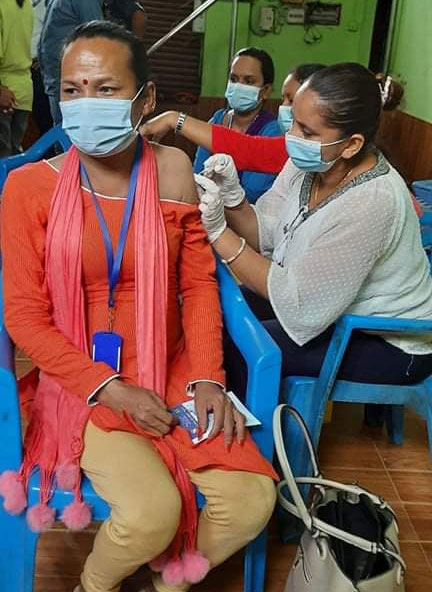Nepal’s transgender community gets vaccinated
A rigid male/female ID system in Nepal was preventing many members of the country’s transgender community from getting the COVID-19 jab. A group of activists, working with the government, is turning things around.
- 17 May 2022
- 4 min read
- by Chhatra Karki

Anik Rana, a member of the transgender community in the Rupandehi district of Nepal, is happy to have received both doses of COVID-19 vaccine. Rana is just one of the whopping 75% of members of transgender community in Rupandehi who have successfully received both the doses.
Although the Nepalese Government has made COVID-19 vaccines widely available, getting a jab was not an easy process for transgender people in the country.
“Vaccinating members of transgender community was crucial. So we launched a dedicated campaign for them. We set up vaccination booths for them in the meeting hall of the municipality. We also included an Others column on the vaccination cards to include them.”

Their plight started with institutionalised binary gender classification. The vaccination card had check boxes only for male and female. “Others”, the term used to denote the transgender community in Nepal, was only added later. The resulting hesitation among transgender members stood as a major hurdle in vaccinating the community.

Photo credit: Anik Rana
“Transgender people are unable to open up because of family pressure, social anxiety and so on. Slogans of equality are popular, but transgender people are still facing discrimination in my district,” Rana laments.
What upset Rana more was the insensitivity of vaccination volunteers at Lumbini Province Hospital when interacting with the transgender community. “The obliviousness of health workers made already nervous people more uncomfortable,” Rana says.
A local awareness campaign and cooperation from the local authorities improved the situation.
“There is a very important lesson here. It is now evident that when transgender people come forward and bring awareness to society, they can enjoy their rights and live a respectful life,” Rana says, highlighting vaccination as a right of every citizen.
Rana is currently expecting a booster dose for members of the transgender community.
Gauri Nepali, of Nepal’s Federation of Sexual and Gender Minorities (FSGMN), agrees: “Members of the transgender community felt anxious and uncomfortable showing citizenship or Identity Cards (IDs) because their IDs are different from the other people,” Nepali says.
“Even though the registration process was online, which made it easy for anyone to register, they had to show their IDs in the vaccination booth, which made them nervous about being judged.
“A discussion was held at the District Department of Health Services with members of the transgender community in order to help them overcome the hesitation,” Nepali says.
Have you read?
Standing in long queues, feeling insecure and anxious and still not getting the vaccine due to gender/identity issues was also a major problem.
Bhumika Shrestha, LGBTIQ+ activist and member of Blue Diamond Society – an organisation actively working to help the transgender community in various districts of Nepal, including Nepalgunj, Rupandehi, and Dhangadhi – says, “A lot of members of the transgender community still have either ‘male’ or ‘female’ as their gender on their documentation, which is not practical in any sense.
“Throughout Nepal, about 900,000 LGTBIQ+ people have come into contact with our organisation, and most of them do not wish to come forward out of fear of being rejected by the society.”
In Nepal, only 174 members of the transgender community have taken up identity documentation with third gender as their description from the District Administration Office.
“Initially, the government did not prioritise the vaccination of the transgender community. However, the members of the transgender community eventually received help from different governmental and non-governmental agencies.
“For instance, the transgender members who did not have citizenship were vaccinated with the help of Maiti Nepal [a non-profit that helps victims of human trafficking],” adds Shrestha, who coordinated the vaccination of more than 500 transgender people.
Keshav Bhattarai, Public Health Inspector at Tilottama Municipality of Rupandehi district, Nepal, recounts the requests from members of the LGBTIQ+ community that minority groups like theirs be given special priority in the vaccination process.

Photo Credit: Anik Rana
“Amid the widespread hesitation, vaccinating members of transgender community was crucial. So, catering to their requests, we launched a dedicated campaign for them. We set up vaccination booths for them in the meeting hall of the municipality,” Bhattarai says. “We also coordinated with different organisations and included an Others column on the vaccination cards to include them.”

Photo credit: Anik Rana.
More from Chhatra Karki
Recommended for you








